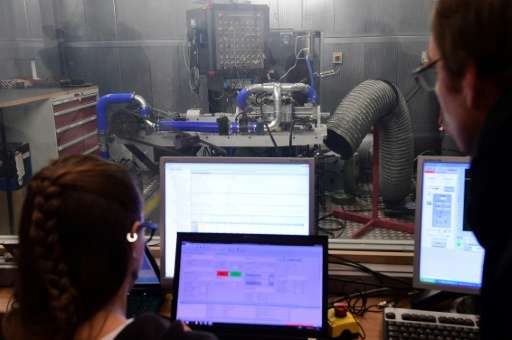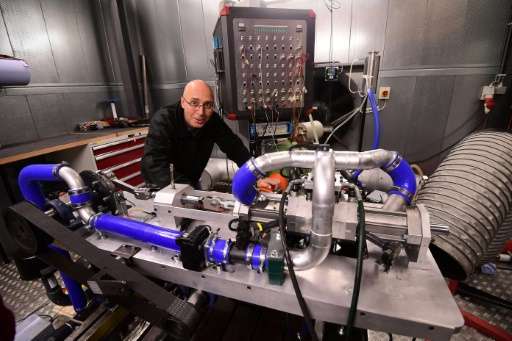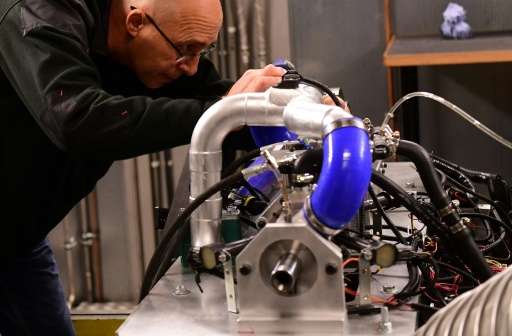Israel firm wants super-efficient engine to power car revolution

An Israeli firm says a super-efficient engine it has created could drastically reduce fuel consumption and help power an auto industry revolution as manufacturers search for environmentally sound alternatives.
Industry analysts, however, question the reinvented internal combustion engine's chances of success at a time when purely electric car technology is advancing and attracting investors.
The invention from Israeli-based Aquarius Engines is currently being discussed by France's Peugeot, the firm said.
Aquarius says the cost of the engine will be as low as $100 (92 euros).
According to the firm, the engine can allow cars to travel more than 1,600 kilometres (990 miles) on a single tank of fuel, more than double current distances.
Such efficiency is vital as countries seek to reduce carbon dioxide emissions—a main cause of climate change. Car engines are a major source of CO2 emissions.
Aquarius's technology works by stripping back the traditional engine under the bonnet.
It replaces the combustion engine with its multiple pistons thrusting up and down with a single piston that goes side-to-side.
It has fewer than 20 parts and a single action, the company said.
In tests by the German engineering company FEV, the Aquarius engine's efficiency was more than double that of traditional engines.

"It is the highest efficiency you will probably meet," co-founder Gal Fridman told AFP at the company's offices near the Israeli commercial capital of Tel Aviv.
"It has the lowest emissions and the highest power-to-weight ratio."
A Peugeot spokesman said: "We are discussing with them, as with many other start-ups, without obligation or a specific project."
For Peugeot and others, the engine could help them compete with the growing popularity of electric cars, John German, senior fellow at the International Council on Clean Transportation, said.
He said the engine would work best as part of a plug-in hybrid system, with manufacturers looking at "the idea of putting a smaller, inexpensive, range extender" alongside a battery and motor.
But he said Aquarius's radical design, and the changes it would require to manufacturing lines, might make companies in a risk-averse industry hesitant.
Undermining electric cars?
The technology can also be used to make more efficient back-up generators and other products, the company says.

Aquarius is currently seeking its third round of funding and is aiming for $40-50 million.
But its challenge is to undermine the push towards electric-only cars, said Ana Nicholls of the Economist Intelligence Unit.
She said recent evidence suggested that "people are starting to trend away from hybrid cars towards fully electric vehicles".
US-based electric car maker Tesla is on course to sell around 50,000 vehicles in the second half of 2016, it has announced.
Nicholls said that automotive giants, with research and development budgets stretched thin, could be wary of investing in Aquarius.
"I think the feeling in the industry at the moment is very much that if they are going to put their resources behind something then probably fully electric engines are the way to go."
Aquarius's Fridman argued there is too much "hype" around purely electric cars, and that their actual popularity is limited because of small ranges and high prices.
"50,000 units is nothing," he said of Tesla's projected sales.

"It is amazing as there has been a push from governments, municipalities, etc. And still after 15 years the segment is not really successful."
Franco Gonzalez, senior technology analyst at the IDTechEx analysis firm, said Aquarius was entering the competition late and playing "catch up".
"Automotive companies take seven to 10 years to implement a new technology," he said.
"So Peugeot would need to accelerate their implementation very, very fast to at least catch up to what Tesla, BYD, Nissan and other companies supporting the electric car model are achieving."
German said it was too early to say if the engine could make a major dent.
"A lot depends on the path the electric vehicle revolution takes. If pure battery electrics sell well then there probably isn't much need for this kind of engine," he said.
"But if people balk at the long recharge time and high costs of battery-only cars, then systems like these might be the future."
© 2016 AFP





















